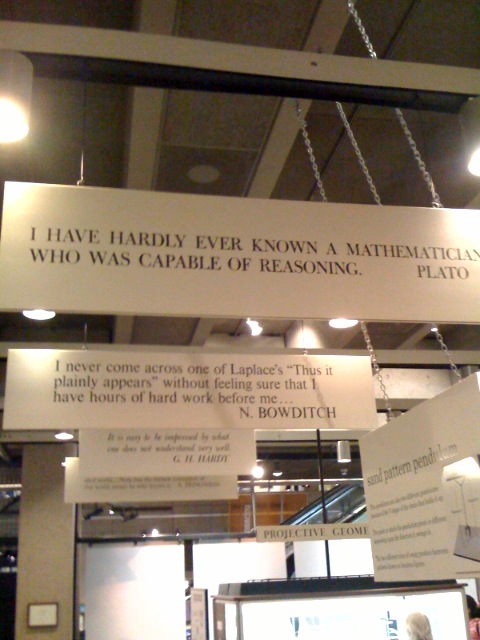
A friend today sent me this picture from the Boston Museum of Science. It’s especially funny to me, because I have formal education in both mathematics and philosophy. And anyone who’s read Plato’s Republic is bound to think it odd.
It’s odd because Plato’s good society, the republic, requires its citizens to study mathematics for ten years. So it’s not like Plato takes math lightly. This quotation arises during Socrates’ and Glaucon’s conversation about education (the character of Socrates speaks in the first person).
[Socrates:] Now, when all these studies reach the point of inter-communion and connection with one another, and come to be considered in their mutual affinities, then, I think, but not till then, will the pursuit of them have a value for our objects; otherwise there is no profit in them.
[Glaucon:] I suspect so; but you are speaking, Socrates, of a vast work.
What do you mean? I said; the prelude or what? Do you not know that all this is but the prelude to the actual strain which we have to learn? For you surely would not regard the skilled mathematician as a dialectician?
Assuredly not, he said; I have hardly ever known a mathematician who was capable of reasoning.
But do you imagine that men who are unable to give and take a reason will have the knowledge which we require of them?
Neither can this be supposed.
Source: Republic 531e, translated by B. Jowett
Jowett translated the Republic in the 19th Century, so having entered the public domain it’s well-distributed, if perhaps not as clear as it could be. Here are the same lines from a couple of other translations:
Surely you would not regard experts in mathematics as masters of dialectic.
Certainly not, except a very few of those I have met.
trans. F.M. Cornford
‘The subjects we’ve described are only a prelude to the main theme we have to learn. For you don’t think that people who are good at them are skilled in dialectic, do you?’
‘Heavens, no, though I have come across a few exceptions.’
trans. Desmond Lee
When Jowett’s translation talks about being “capable of reasoning,” it’s referring to “dialectic,” which for Plato is a special way of reasoning, not just reasoning in general. “Dialectic” is the capstone of Plato’s proposed education; after training in it for five years, the leaders of his republic should begin to understand philosophical issues.
So we can let mathematicians off the hook a little bit: Plato’s not saying they’re unreasonable, just that they generally haven’t achieved the heights of thinking made available by dialectic. Why this is so comes out a little bit later in the next book:
The detached studies in which they were educated as children will now be brought together in a comprehensive view of their connexions with one another and with reality.
Certainly that is the only kind of knowledge which takes firm root in the mind.
Yes, and the chief test of a natural gift for Dialectic, which is the same thing as the ability to see the connexions of things.
…
When they reach thirty they will be promoted to still higher privileges and tested by the power of Dialectic, to see which can dispense with sight and the other senses and follow truth into the region of pure reality.Source: Republic 537, trans. Cornford
In other words, dialectic brings everything together. Referring to his famous allegory of the cave, Plato is saying that dialectic is like the last step, where the former prisoners are no longer seeing shadows or indirect images, but are looking at the “sun” of truth. The problem with mathematics by itself is that it doesn’t provide the big picture; it’s limited to a particular discipline, so it’s merely a shadow of the form of the Good.
One Comment
Congratulations on your beautiful post. Before I read it, the picture looked odd to me. I’ve checked my Italian translation and it sounds like:
“Surely you would not regard experts in mathematics as masters of dialectic.
Certainly not, except a very few of those I have met”
I remember that Plato in The Republic says also that mathematics it’s a good training for dialectics because, it’s very easy to understand.
What would have he thought today?
What would have he thought about integral calculus, non-Euclidean geometry, complex numbers and so on?
(sorry for my english)…
Bye
2 Trackbacks
[…] […]
[…] Plato and Unreasonable Mathematicians – Il Filosofo […]